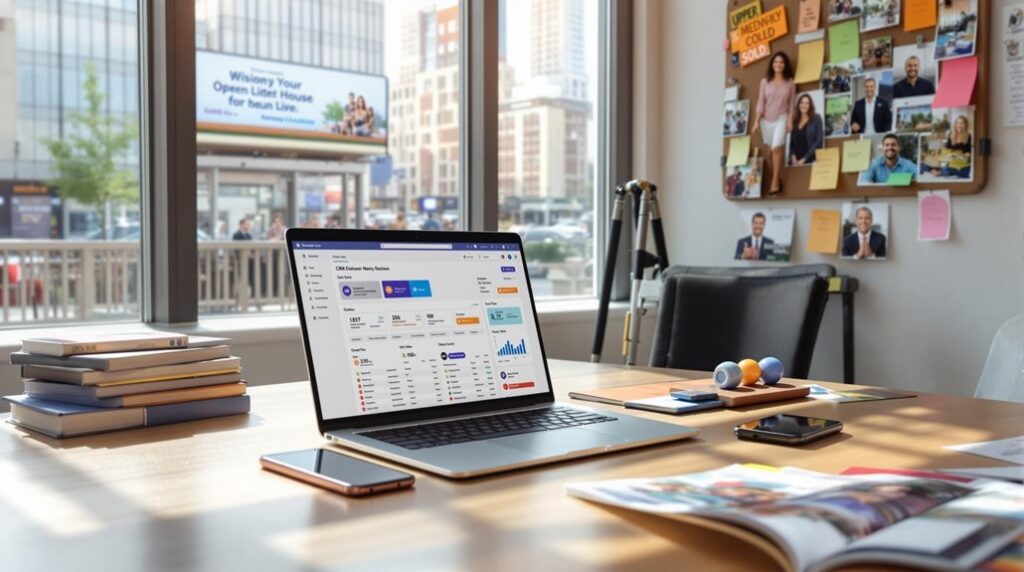When it comes to giving your Real Geeks website a little nudge in the right direction, focusing on SEO best practices can make all the difference. You should start by enhancing technical aspects like site speed and security, which are essential behind-the-scenes elements. But that’s just the tip of the iceberg. Crafting engaging content and integrating local and long-tail keywords can greatly boost your visibility. And let’s not forget about the importance of quality backlinks and leveraging the right tools. Curious about how these strategies can transform your website’s performance? There’s much more to uncover.
Optimize Technical Performance
Optimizing your website’s technical performance is vital for enhancing user experience and boosting search engine rankings. Start by speeding up your site. Compress images with tools like TinyPNG to reduce file sizes without sacrificing quality.
Enable browser caching to store your site locally on visitors’ browsers, speeding up load times for repeat visitors. Minifying CSS, JavaScript, and HTML can also cut unnecessary code, making your site faster. A Content Delivery Network (CDN) can further improve speed by serving data from the server closest to your user.
Don’t forget about mobile optimization. A responsive design guarantees your site looks great on any device. Avoid using intrusive pop-ups that frustrate users and harm your search rankings. Make certain that interactive elements are big enough to tap easily.
Test mobile usability with tools like Google’s Mobile-Friendly Test to confirm everything’s working smoothly. Boost crawlability and indexability by optimizing your XML sitemaps and Robots.txt files. Implementing schema markup helps search engines understand your content better, enhancing visibility. Enhancing your site’s infrastructure to meet search engine requirements is crucial for technical SEO.
Regular SEO audits are essential for spotting issues early. Use tools like Google PageSpeed Insights to get specific tips for improving your site’s technical performance.
Enhance Content Structure
A well-structured content layout is essential for both user experience and search engine optimization. When you organize your content logically, it makes a world of difference for readers and search engines alike. Start by using subheadings (H2-H6) to divide your content into clear sections. This not only helps Google navigate your site but also makes it easier for readers to scan and understand. Google reCAPTCHA is often used to protect websites from bots, ensuring legitimate user interactions.
To keep your site user-friendly, maintain a clear navigation menu and logical categories. Structuring your site like a pyramid—with the homepage at the top, linking to category pages, and then to specific pages—ensures Google can index your content effectively. Pay attention to your URL structure as well; use simple, clear URLs with primary keywords.
Here’s a quick overview:
| Key Element | Actionable Tip |
|---|---|
| Logical Hierarchy | Use subheadings (H2-H6) for easy navigation. |
| Clear Navigation | Keep menus simple and categories logical. |
| Theme Pyramid Structure | Link homepage to categories, then to specific pages. |
| URL Structure | Use clear, keyword-rich URLs. |
Include Strategic Internal Linking for IDX Websites
For websites leveraging IDX (Internet Data Exchange), internal linking is not just a best practice—it’s a necessity. IDX websites often contain vast amounts of property listings, and a robust internal linking strategy can enhance both user navigation and SEO performance. By strategically linking property pages to relevant content, such as neighborhood guides, market reports, or blog posts, you create a seamless user experience while boosting the visibility of key pages.
Here’s how internal linking benefits IDX websites:
- Boosts Indexability: Properly linking all property pages ensures they are crawled and indexed efficiently by search engines.
- Improves User Journey: Linking listings to related neighborhood guides or blogs helps users find more information, keeping them on your site longer.
- Passes Link Equity: Internal links from high-authority pages, like your homepage or cornerstone content, can strengthen the rankings of listing pages.
- Encourages Discoverability: Property listings buried deep in the site structure can be surfaced by linking them in guides or blog posts.
Actionable Tips for IDX Websites:
- Link new property listings to related community guides or pages with similar listings.
- Use descriptive anchor text for internal links, such as “Explore homes in [neighborhood name]” instead of generic terms like “Click here.”
- Regularly audit your internal linking structure to identify and fix broken or outdated links.
- Create hub pages for popular locations or types of properties and link related listings to these hubs.
By incorporating strategic internal linking, IDX websites can ensure their large volume of content is both accessible and optimized for search engines.
Improve Local Search Visibility
To enhance your website’s local search visibility, start by optimizing your Google Business Profile. Complete and accurate information is vital—make certain your business name, address, and phone number (NAP) are consistent across all platforms. Regularly update your profile with new photos and posts to engage potential customers. Claiming and verifying your profile establishes credibility and increases your chances of appearing in local search results. Local SEO is a low-cost marketing strategy with significant ROI, making it an efficient choice for businesses aiming to improve their local presence. Incorporate local keywords naturally into your website’s title tags, meta descriptions, and content. This helps distinguish your site from generic content, boosting visibility in search engine results pages (SERPs). Creating localized content that resonates with your audience—like local events and trends—strengthens your connection to the community and enhances search rankings. Given that many local searches occur on mobile devices, optimizing your site for mobile users is essential. Make certain fast loading speeds and clear navigation for a smooth user experience. Engage with your local community by participating in or sponsoring events. Share these activities on your website and social media to boost visibility. Encourage customer reviews on platforms like Google and Yelp, and be sure to respond to all feedback, showcasing your dedication to excellent service.
Build Quality Backlinks
Building quality backlinks is vital for boosting your website’s authority and search engine rankings. Focus on obtaining high-quality backlinks from authoritative and relevant websites. Quality always trumps quantity here. Links from sites with high domain authority (DA) can considerably boost your credibility. They’re trusted by users and search engines alike, making them ideal for your link-building efforts. Search engines consider backlinks a key ranking factor, so it’s important to prioritize acquiring them from reputable sources.
Ensure your backlinks are contextually relevant. They should naturally fit within the content and relate topically to the destination. Prioritize dofollow links, especially when they’re high-quality and relevant, as they’re essential for enhancing your SEO. Aim for in-content links, as they deliver more SEO value than those tucked away in footers or sidebars.
To build these links, create content that’s informative and shareable. Guest blogging on authoritative sites in your industry is another effective strategy. Develop thorough resources or guides that others will want to link to. Use broken link building by offering your content as a replacement for broken links. Engage with influencers to broaden your reach.
Regularly audit your backlink profile to maintain its health. Diversify your anchor text and steer clear of manipulative tactics like buying links. Focus on relevance over sheer authority for the best results.
Leverage SEO Tools and Resources
In the ever-evolving landscape of digital marketing, leveraging SEO tools and resources is essential to staying ahead of the competition. Using the right tools can help you identify weaknesses, optimize content, and track progress effectively. Semrush and Ahrefs offer powerful SEO audits and analysis tools to uncover technical issues and provide solutions. Google Lighthouse can also enhance your site’s performance by highlighting areas that need improvement. In addition to these tools, Moz offers a range of SEO capabilities, including link building and site audits, making it a comprehensive choice for optimizing your digital strategy.
When it comes to keyword research, tools like KWFinder and Ahrefs’ Keyword Generator are invaluable. They help you discover long-tail keywords, assess search volume, and understand keyword difficulty. Rank Math is a great addition for optimizing your content, offering title tag suggestions and SEO scores.
To keep track of your performance, consider rank tracking and SERP analysis tools like SEMrush and SERPChecker. They provide insights into page rankings and competitor analysis, vital for maintaining your SEO edge.
- SEO Audits: Use Semrush, Ahrefs, or Google Lighthouse for detailed site analysis.
- Keyword Tools: Leverage KWFinder or Ahrefs for keyword insights.
- Rank Tracking: Monitor your progress with SEMrush or SERPChecker.
Final Thoughts
You’ve got the power to transform your Real Geeks website into an SEO powerhouse! By optimizing technical performance, crafting irresistible content, boosting local search visibility, and building quality backlinks, you’re not just enhancing your site—you’re catapulting it to unimaginable heights. Immerse yourself in these strategies with enthusiasm and watch your online presence flourish. Remember, the journey of a thousand clicks begins with a single step. So, get started today and make your website truly shine!


